An Analysis of the Impact of ICT on Tourism in Developing Countries
VerifiedAdded on 2023/06/10
|7
|1825
|484
Essay
AI Summary
This essay investigates the profound impact of Information and Communication Technologies (ICT) on the tourism industry, particularly in developing countries. It highlights how ICT has revolutionized various aspects of the tourism sector, including service provision, management, marketing, and overall development. The essay emphasizes the opportunities and challenges presented by ICT, such as wireless internet, smartphone applications, and online platforms, which have reshaped the industry's operations. It argues that countries lacking robust ICT infrastructure may struggle to compete in the evolving market. The essay explores how ICT enhances productivity, market share, business performance, and competitive advantages within sub-sectors like accommodation and travel agencies. While acknowledging the potential benefits, the essay also addresses the limitations of ICT, such as information fragmentation and the need for tailored search engines. The conclusion underscores the importance of ICT for the advancement of the tourism industry in developing countries and the need to address its limitations to fully realize its potential.
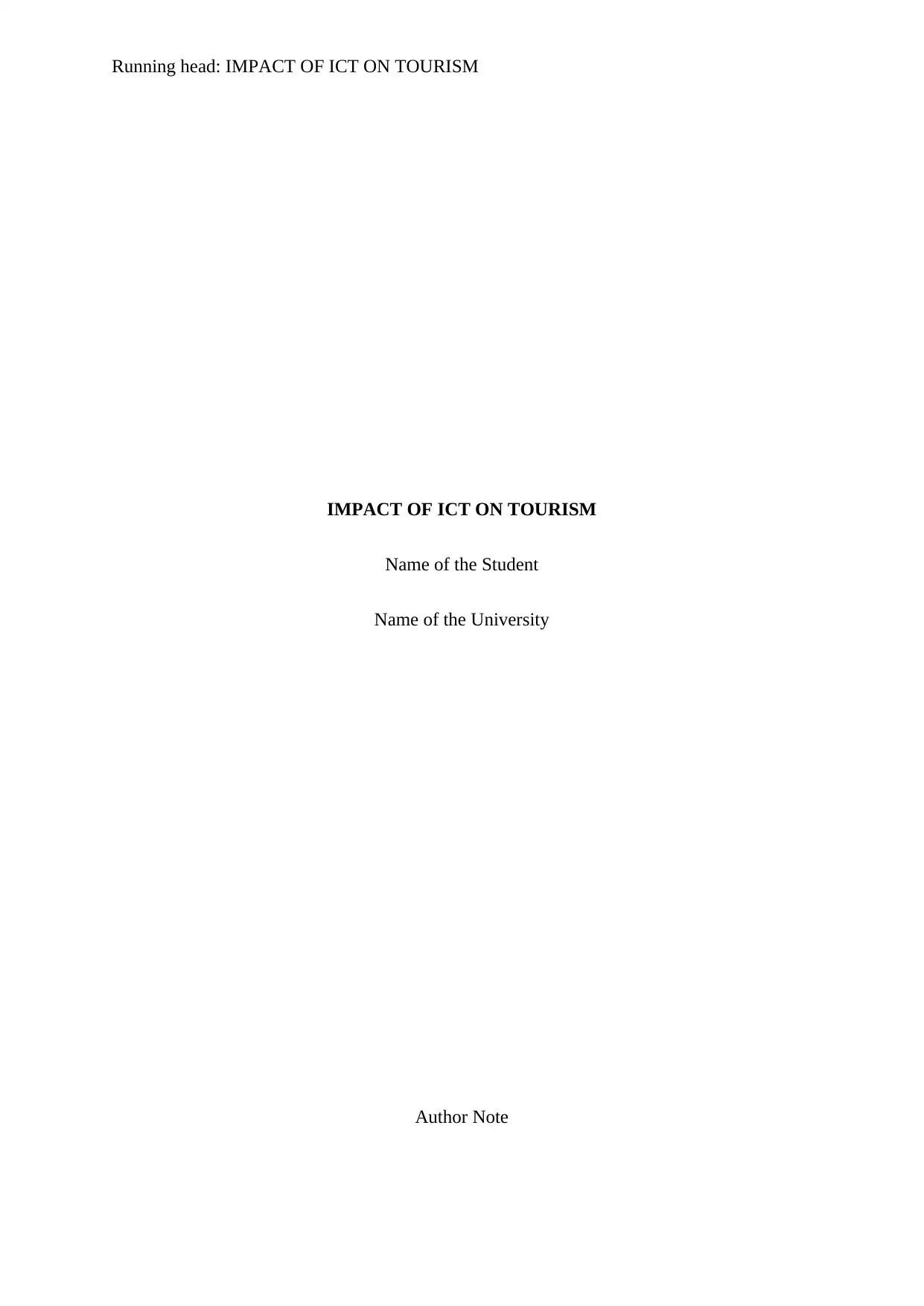
Running head: IMPACT OF ICT ON TOURISM
IMPACT OF ICT ON TOURISM
Name of the Student
Name of the University
Author Note
IMPACT OF ICT ON TOURISM
Name of the Student
Name of the University
Author Note
Paraphrase This Document
Need a fresh take? Get an instant paraphrase of this document with our AI Paraphraser
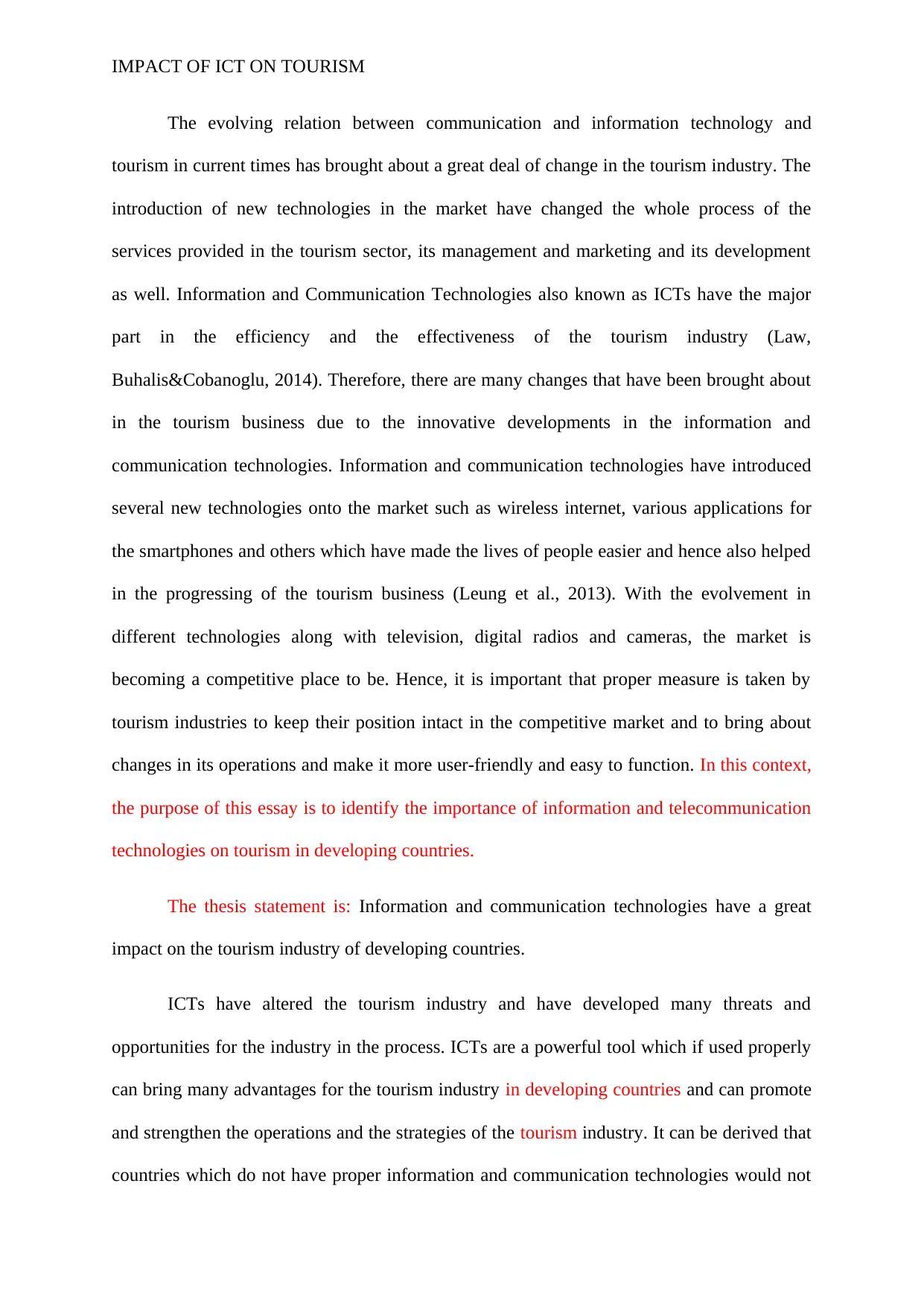
IMPACT OF ICT ON TOURISM
The evolving relation between communication and information technology and
tourism in current times has brought about a great deal of change in the tourism industry. The
introduction of new technologies in the market have changed the whole process of the
services provided in the tourism sector, its management and marketing and its development
as well. Information and Communication Technologies also known as ICTs have the major
part in the efficiency and the effectiveness of the tourism industry (Law,
Buhalis&Cobanoglu, 2014). Therefore, there are many changes that have been brought about
in the tourism business due to the innovative developments in the information and
communication technologies. Information and communication technologies have introduced
several new technologies onto the market such as wireless internet, various applications for
the smartphones and others which have made the lives of people easier and hence also helped
in the progressing of the tourism business (Leung et al., 2013). With the evolvement in
different technologies along with television, digital radios and cameras, the market is
becoming a competitive place to be. Hence, it is important that proper measure is taken by
tourism industries to keep their position intact in the competitive market and to bring about
changes in its operations and make it more user-friendly and easy to function. In this context,
the purpose of this essay is to identify the importance of information and telecommunication
technologies on tourism in developing countries.
The thesis statement is: Information and communication technologies have a great
impact on the tourism industry of developing countries.
ICTs have altered the tourism industry and have developed many threats and
opportunities for the industry in the process. ICTs are a powerful tool which if used properly
can bring many advantages for the tourism industry in developing countries and can promote
and strengthen the operations and the strategies of the tourism industry. It can be derived that
countries which do not have proper information and communication technologies would not
The evolving relation between communication and information technology and
tourism in current times has brought about a great deal of change in the tourism industry. The
introduction of new technologies in the market have changed the whole process of the
services provided in the tourism sector, its management and marketing and its development
as well. Information and Communication Technologies also known as ICTs have the major
part in the efficiency and the effectiveness of the tourism industry (Law,
Buhalis&Cobanoglu, 2014). Therefore, there are many changes that have been brought about
in the tourism business due to the innovative developments in the information and
communication technologies. Information and communication technologies have introduced
several new technologies onto the market such as wireless internet, various applications for
the smartphones and others which have made the lives of people easier and hence also helped
in the progressing of the tourism business (Leung et al., 2013). With the evolvement in
different technologies along with television, digital radios and cameras, the market is
becoming a competitive place to be. Hence, it is important that proper measure is taken by
tourism industries to keep their position intact in the competitive market and to bring about
changes in its operations and make it more user-friendly and easy to function. In this context,
the purpose of this essay is to identify the importance of information and telecommunication
technologies on tourism in developing countries.
The thesis statement is: Information and communication technologies have a great
impact on the tourism industry of developing countries.
ICTs have altered the tourism industry and have developed many threats and
opportunities for the industry in the process. ICTs are a powerful tool which if used properly
can bring many advantages for the tourism industry in developing countries and can promote
and strengthen the operations and the strategies of the tourism industry. It can be derived that
countries which do not have proper information and communication technologies would not
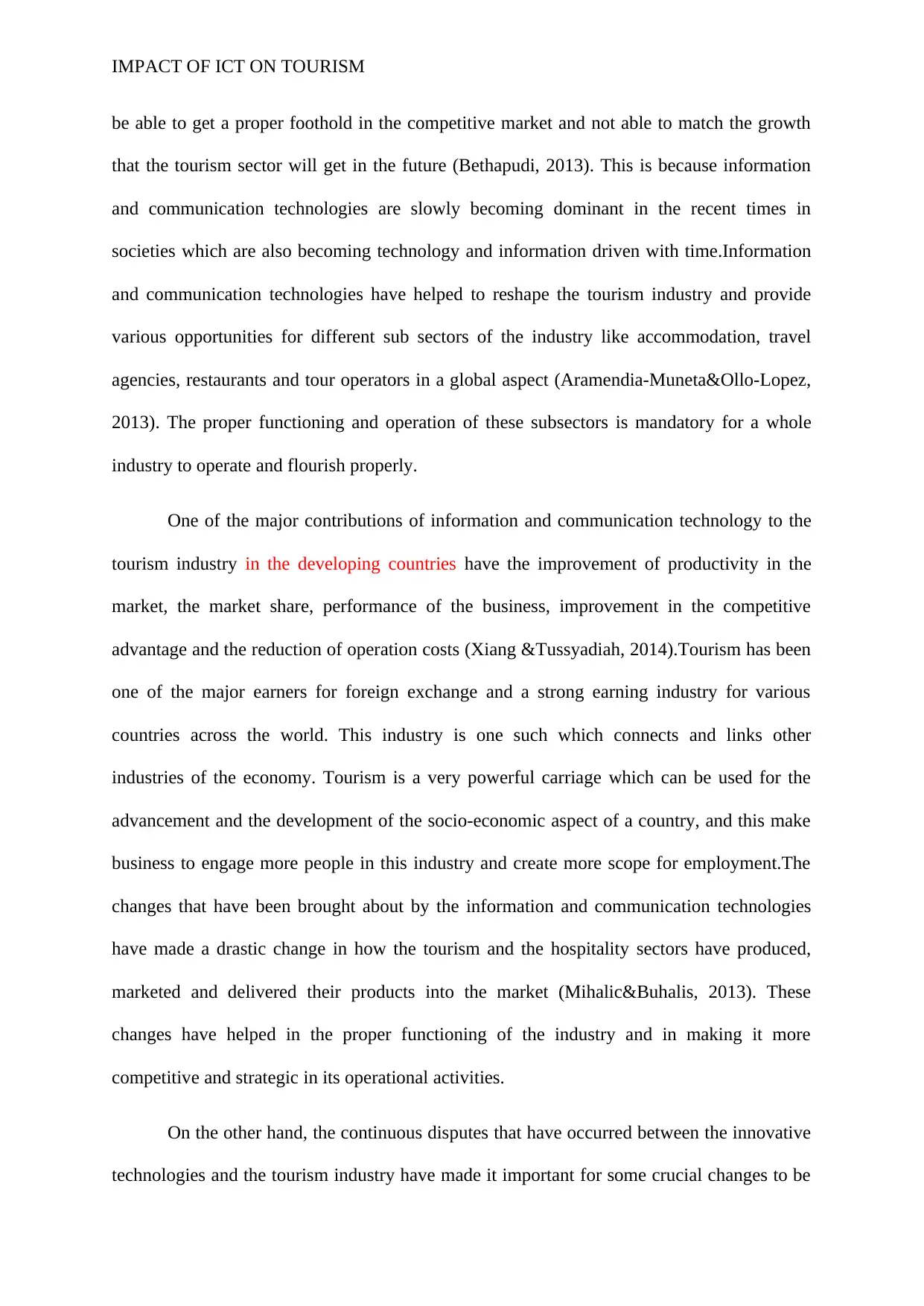
IMPACT OF ICT ON TOURISM
be able to get a proper foothold in the competitive market and not able to match the growth
that the tourism sector will get in the future (Bethapudi, 2013). This is because information
and communication technologies are slowly becoming dominant in the recent times in
societies which are also becoming technology and information driven with time.Information
and communication technologies have helped to reshape the tourism industry and provide
various opportunities for different sub sectors of the industry like accommodation, travel
agencies, restaurants and tour operators in a global aspect (Aramendia-Muneta&Ollo-Lopez,
2013). The proper functioning and operation of these subsectors is mandatory for a whole
industry to operate and flourish properly.
One of the major contributions of information and communication technology to the
tourism industry in the developing countries have the improvement of productivity in the
market, the market share, performance of the business, improvement in the competitive
advantage and the reduction of operation costs (Xiang &Tussyadiah, 2014).Tourism has been
one of the major earners for foreign exchange and a strong earning industry for various
countries across the world. This industry is one such which connects and links other
industries of the economy. Tourism is a very powerful carriage which can be used for the
advancement and the development of the socio-economic aspect of a country, and this make
business to engage more people in this industry and create more scope for employment.The
changes that have been brought about by the information and communication technologies
have made a drastic change in how the tourism and the hospitality sectors have produced,
marketed and delivered their products into the market (Mihalic&Buhalis, 2013). These
changes have helped in the proper functioning of the industry and in making it more
competitive and strategic in its operational activities.
On the other hand, the continuous disputes that have occurred between the innovative
technologies and the tourism industry have made it important for some crucial changes to be
be able to get a proper foothold in the competitive market and not able to match the growth
that the tourism sector will get in the future (Bethapudi, 2013). This is because information
and communication technologies are slowly becoming dominant in the recent times in
societies which are also becoming technology and information driven with time.Information
and communication technologies have helped to reshape the tourism industry and provide
various opportunities for different sub sectors of the industry like accommodation, travel
agencies, restaurants and tour operators in a global aspect (Aramendia-Muneta&Ollo-Lopez,
2013). The proper functioning and operation of these subsectors is mandatory for a whole
industry to operate and flourish properly.
One of the major contributions of information and communication technology to the
tourism industry in the developing countries have the improvement of productivity in the
market, the market share, performance of the business, improvement in the competitive
advantage and the reduction of operation costs (Xiang &Tussyadiah, 2014).Tourism has been
one of the major earners for foreign exchange and a strong earning industry for various
countries across the world. This industry is one such which connects and links other
industries of the economy. Tourism is a very powerful carriage which can be used for the
advancement and the development of the socio-economic aspect of a country, and this make
business to engage more people in this industry and create more scope for employment.The
changes that have been brought about by the information and communication technologies
have made a drastic change in how the tourism and the hospitality sectors have produced,
marketed and delivered their products into the market (Mihalic&Buhalis, 2013). These
changes have helped in the proper functioning of the industry and in making it more
competitive and strategic in its operational activities.
On the other hand, the continuous disputes that have occurred between the innovative
technologies and the tourism industry have made it important for some crucial changes to be
⊘ This is a preview!⊘
Do you want full access?
Subscribe today to unlock all pages.

Trusted by 1+ million students worldwide
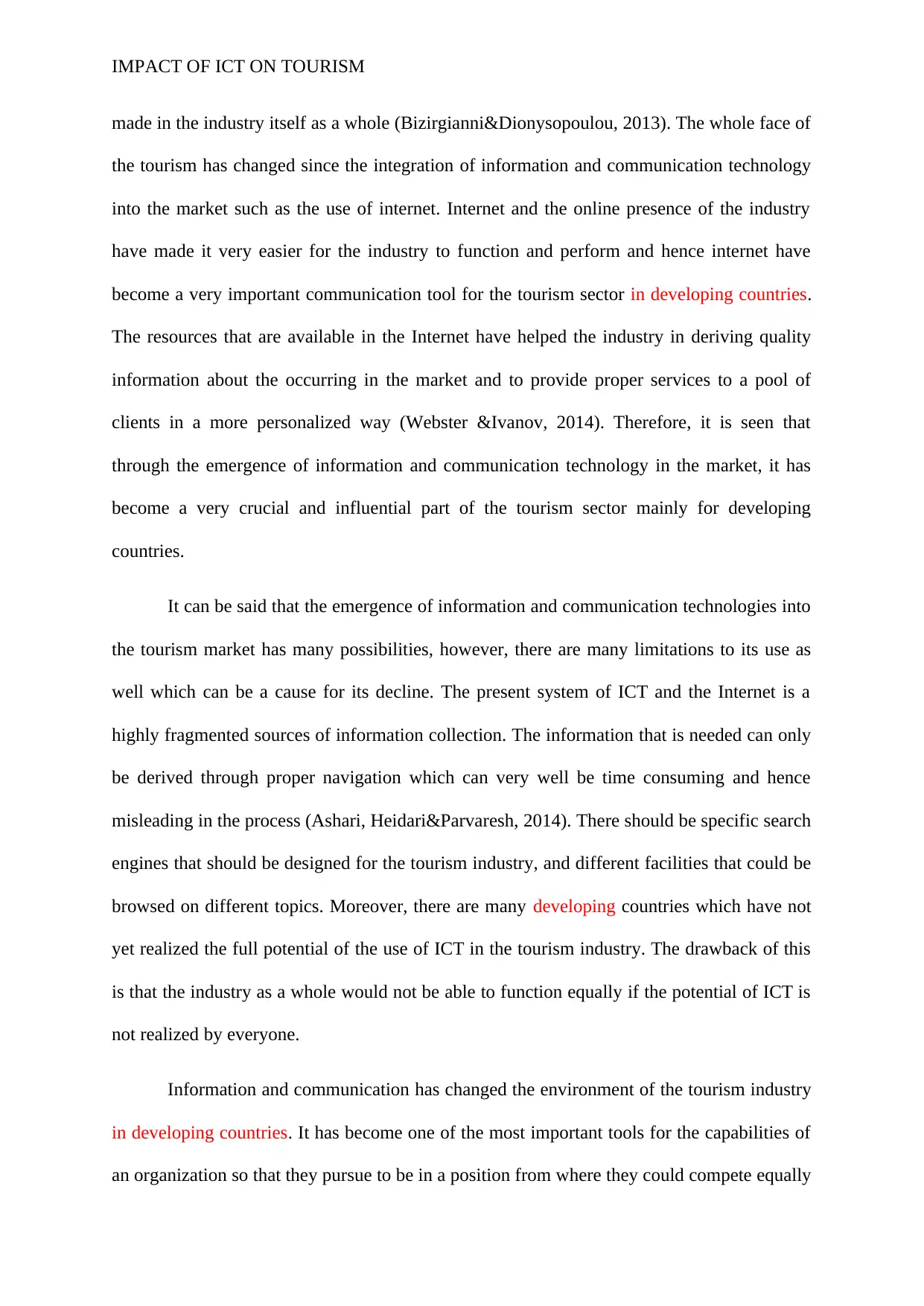
IMPACT OF ICT ON TOURISM
made in the industry itself as a whole (Bizirgianni&Dionysopoulou, 2013). The whole face of
the tourism has changed since the integration of information and communication technology
into the market such as the use of internet. Internet and the online presence of the industry
have made it very easier for the industry to function and perform and hence internet have
become a very important communication tool for the tourism sector in developing countries.
The resources that are available in the Internet have helped the industry in deriving quality
information about the occurring in the market and to provide proper services to a pool of
clients in a more personalized way (Webster &Ivanov, 2014). Therefore, it is seen that
through the emergence of information and communication technology in the market, it has
become a very crucial and influential part of the tourism sector mainly for developing
countries.
It can be said that the emergence of information and communication technologies into
the tourism market has many possibilities, however, there are many limitations to its use as
well which can be a cause for its decline. The present system of ICT and the Internet is a
highly fragmented sources of information collection. The information that is needed can only
be derived through proper navigation which can very well be time consuming and hence
misleading in the process (Ashari, Heidari&Parvaresh, 2014). There should be specific search
engines that should be designed for the tourism industry, and different facilities that could be
browsed on different topics. Moreover, there are many developing countries which have not
yet realized the full potential of the use of ICT in the tourism industry. The drawback of this
is that the industry as a whole would not be able to function equally if the potential of ICT is
not realized by everyone.
Information and communication has changed the environment of the tourism industry
in developing countries. It has become one of the most important tools for the capabilities of
an organization so that they pursue to be in a position from where they could compete equally
made in the industry itself as a whole (Bizirgianni&Dionysopoulou, 2013). The whole face of
the tourism has changed since the integration of information and communication technology
into the market such as the use of internet. Internet and the online presence of the industry
have made it very easier for the industry to function and perform and hence internet have
become a very important communication tool for the tourism sector in developing countries.
The resources that are available in the Internet have helped the industry in deriving quality
information about the occurring in the market and to provide proper services to a pool of
clients in a more personalized way (Webster &Ivanov, 2014). Therefore, it is seen that
through the emergence of information and communication technology in the market, it has
become a very crucial and influential part of the tourism sector mainly for developing
countries.
It can be said that the emergence of information and communication technologies into
the tourism market has many possibilities, however, there are many limitations to its use as
well which can be a cause for its decline. The present system of ICT and the Internet is a
highly fragmented sources of information collection. The information that is needed can only
be derived through proper navigation which can very well be time consuming and hence
misleading in the process (Ashari, Heidari&Parvaresh, 2014). There should be specific search
engines that should be designed for the tourism industry, and different facilities that could be
browsed on different topics. Moreover, there are many developing countries which have not
yet realized the full potential of the use of ICT in the tourism industry. The drawback of this
is that the industry as a whole would not be able to function equally if the potential of ICT is
not realized by everyone.
Information and communication has changed the environment of the tourism industry
in developing countries. It has become one of the most important tools for the capabilities of
an organization so that they pursue to be in a position from where they could compete equally
Paraphrase This Document
Need a fresh take? Get an instant paraphrase of this document with our AI Paraphraser
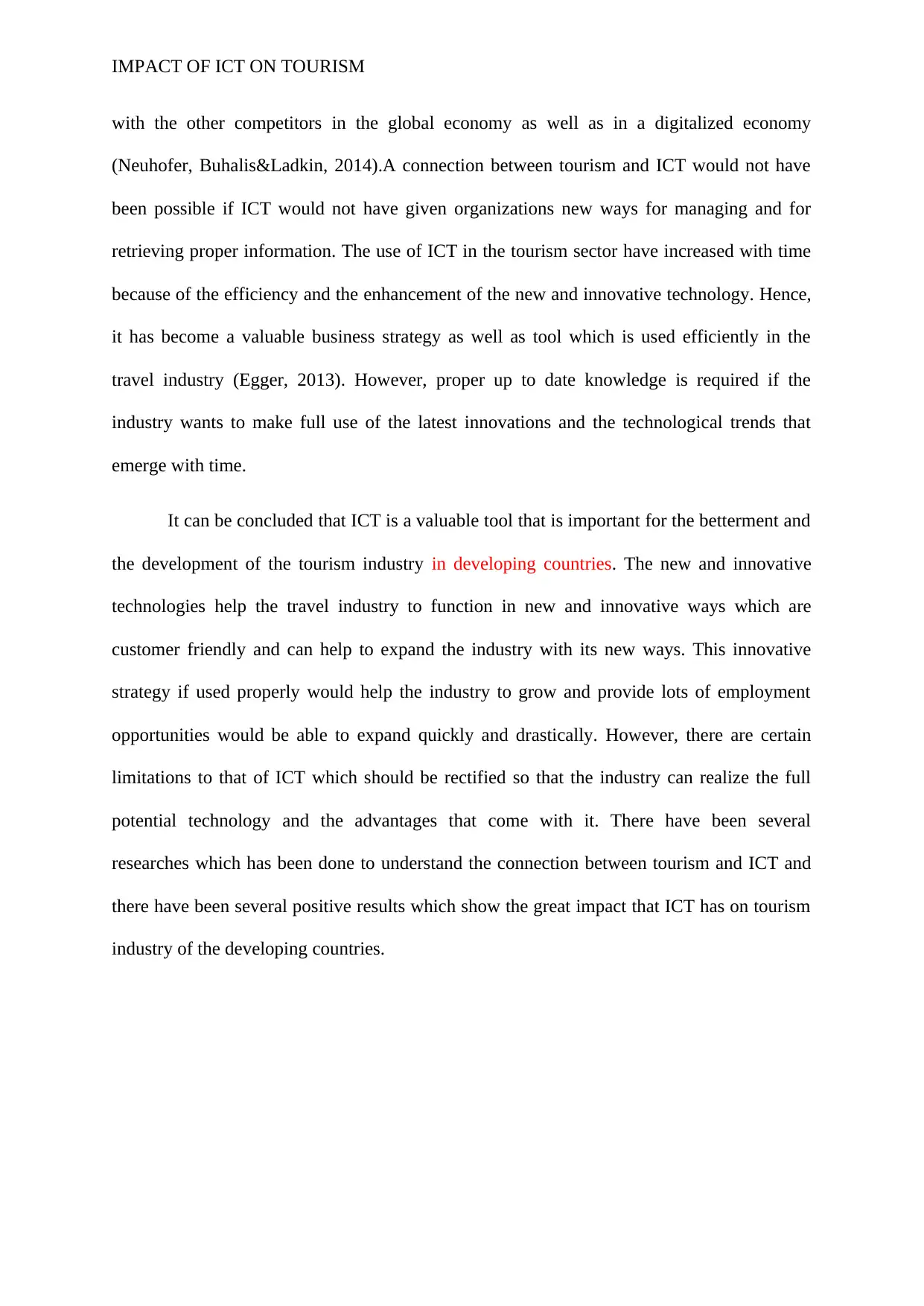
IMPACT OF ICT ON TOURISM
with the other competitors in the global economy as well as in a digitalized economy
(Neuhofer, Buhalis&Ladkin, 2014).A connection between tourism and ICT would not have
been possible if ICT would not have given organizations new ways for managing and for
retrieving proper information. The use of ICT in the tourism sector have increased with time
because of the efficiency and the enhancement of the new and innovative technology. Hence,
it has become a valuable business strategy as well as tool which is used efficiently in the
travel industry (Egger, 2013). However, proper up to date knowledge is required if the
industry wants to make full use of the latest innovations and the technological trends that
emerge with time.
It can be concluded that ICT is a valuable tool that is important for the betterment and
the development of the tourism industry in developing countries. The new and innovative
technologies help the travel industry to function in new and innovative ways which are
customer friendly and can help to expand the industry with its new ways. This innovative
strategy if used properly would help the industry to grow and provide lots of employment
opportunities would be able to expand quickly and drastically. However, there are certain
limitations to that of ICT which should be rectified so that the industry can realize the full
potential technology and the advantages that come with it. There have been several
researches which has been done to understand the connection between tourism and ICT and
there have been several positive results which show the great impact that ICT has on tourism
industry of the developing countries.
with the other competitors in the global economy as well as in a digitalized economy
(Neuhofer, Buhalis&Ladkin, 2014).A connection between tourism and ICT would not have
been possible if ICT would not have given organizations new ways for managing and for
retrieving proper information. The use of ICT in the tourism sector have increased with time
because of the efficiency and the enhancement of the new and innovative technology. Hence,
it has become a valuable business strategy as well as tool which is used efficiently in the
travel industry (Egger, 2013). However, proper up to date knowledge is required if the
industry wants to make full use of the latest innovations and the technological trends that
emerge with time.
It can be concluded that ICT is a valuable tool that is important for the betterment and
the development of the tourism industry in developing countries. The new and innovative
technologies help the travel industry to function in new and innovative ways which are
customer friendly and can help to expand the industry with its new ways. This innovative
strategy if used properly would help the industry to grow and provide lots of employment
opportunities would be able to expand quickly and drastically. However, there are certain
limitations to that of ICT which should be rectified so that the industry can realize the full
potential technology and the advantages that come with it. There have been several
researches which has been done to understand the connection between tourism and ICT and
there have been several positive results which show the great impact that ICT has on tourism
industry of the developing countries.
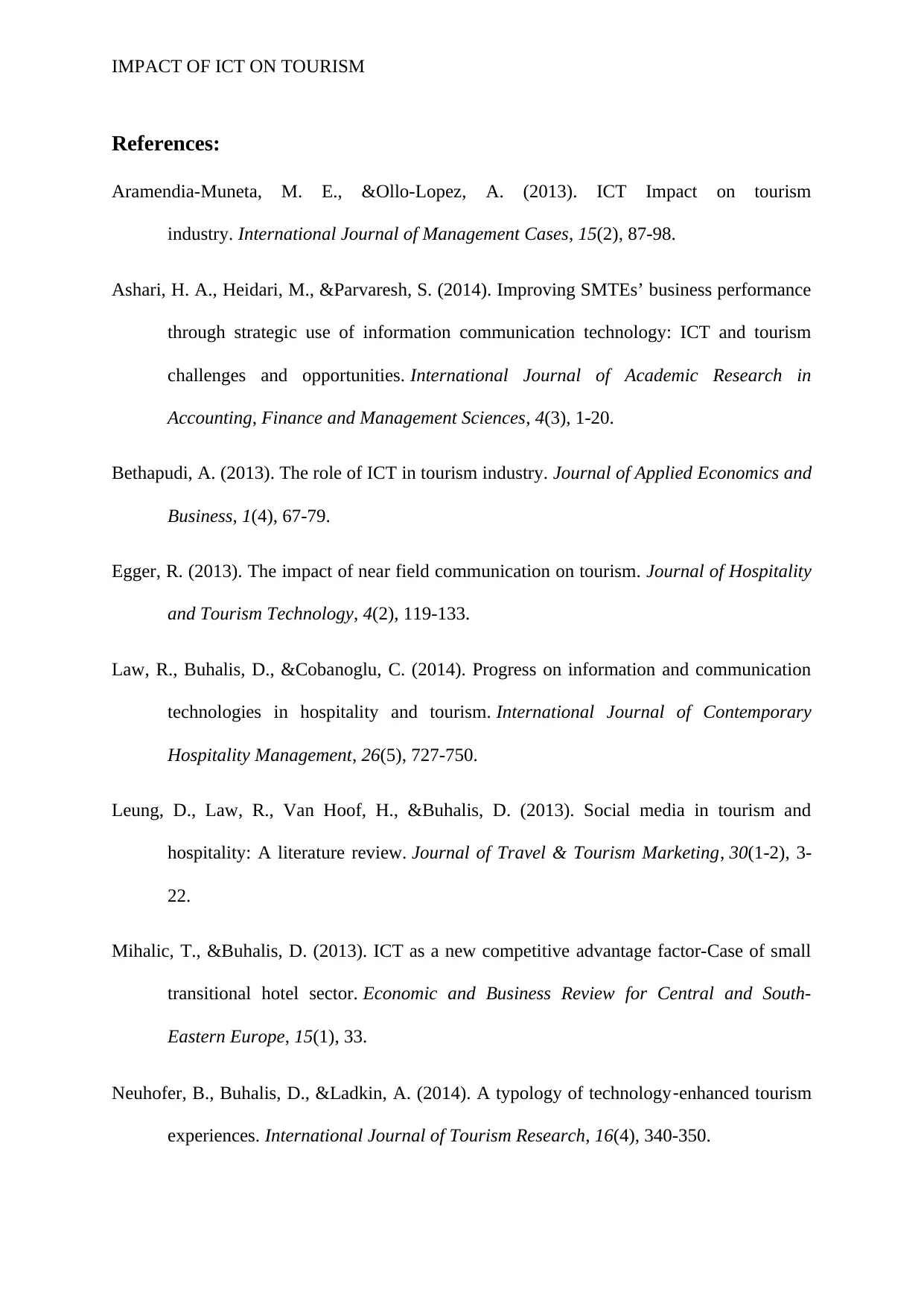
IMPACT OF ICT ON TOURISM
References:
Aramendia-Muneta, M. E., &Ollo-Lopez, A. (2013). ICT Impact on tourism
industry. International Journal of Management Cases, 15(2), 87-98.
Ashari, H. A., Heidari, M., &Parvaresh, S. (2014). Improving SMTEs’ business performance
through strategic use of information communication technology: ICT and tourism
challenges and opportunities. International Journal of Academic Research in
Accounting, Finance and Management Sciences, 4(3), 1-20.
Bethapudi, A. (2013). The role of ICT in tourism industry. Journal of Applied Economics and
Business, 1(4), 67-79.
Egger, R. (2013). The impact of near field communication on tourism. Journal of Hospitality
and Tourism Technology, 4(2), 119-133.
Law, R., Buhalis, D., &Cobanoglu, C. (2014). Progress on information and communication
technologies in hospitality and tourism. International Journal of Contemporary
Hospitality Management, 26(5), 727-750.
Leung, D., Law, R., Van Hoof, H., &Buhalis, D. (2013). Social media in tourism and
hospitality: A literature review. Journal of Travel & Tourism Marketing, 30(1-2), 3-
22.
Mihalic, T., &Buhalis, D. (2013). ICT as a new competitive advantage factor-Case of small
transitional hotel sector. Economic and Business Review for Central and South-
Eastern Europe, 15(1), 33.
Neuhofer, B., Buhalis, D., &Ladkin, A. (2014). A typology of technology‐enhanced tourism
experiences. International Journal of Tourism Research, 16(4), 340-350.
References:
Aramendia-Muneta, M. E., &Ollo-Lopez, A. (2013). ICT Impact on tourism
industry. International Journal of Management Cases, 15(2), 87-98.
Ashari, H. A., Heidari, M., &Parvaresh, S. (2014). Improving SMTEs’ business performance
through strategic use of information communication technology: ICT and tourism
challenges and opportunities. International Journal of Academic Research in
Accounting, Finance and Management Sciences, 4(3), 1-20.
Bethapudi, A. (2013). The role of ICT in tourism industry. Journal of Applied Economics and
Business, 1(4), 67-79.
Egger, R. (2013). The impact of near field communication on tourism. Journal of Hospitality
and Tourism Technology, 4(2), 119-133.
Law, R., Buhalis, D., &Cobanoglu, C. (2014). Progress on information and communication
technologies in hospitality and tourism. International Journal of Contemporary
Hospitality Management, 26(5), 727-750.
Leung, D., Law, R., Van Hoof, H., &Buhalis, D. (2013). Social media in tourism and
hospitality: A literature review. Journal of Travel & Tourism Marketing, 30(1-2), 3-
22.
Mihalic, T., &Buhalis, D. (2013). ICT as a new competitive advantage factor-Case of small
transitional hotel sector. Economic and Business Review for Central and South-
Eastern Europe, 15(1), 33.
Neuhofer, B., Buhalis, D., &Ladkin, A. (2014). A typology of technology‐enhanced tourism
experiences. International Journal of Tourism Research, 16(4), 340-350.
⊘ This is a preview!⊘
Do you want full access?
Subscribe today to unlock all pages.

Trusted by 1+ million students worldwide
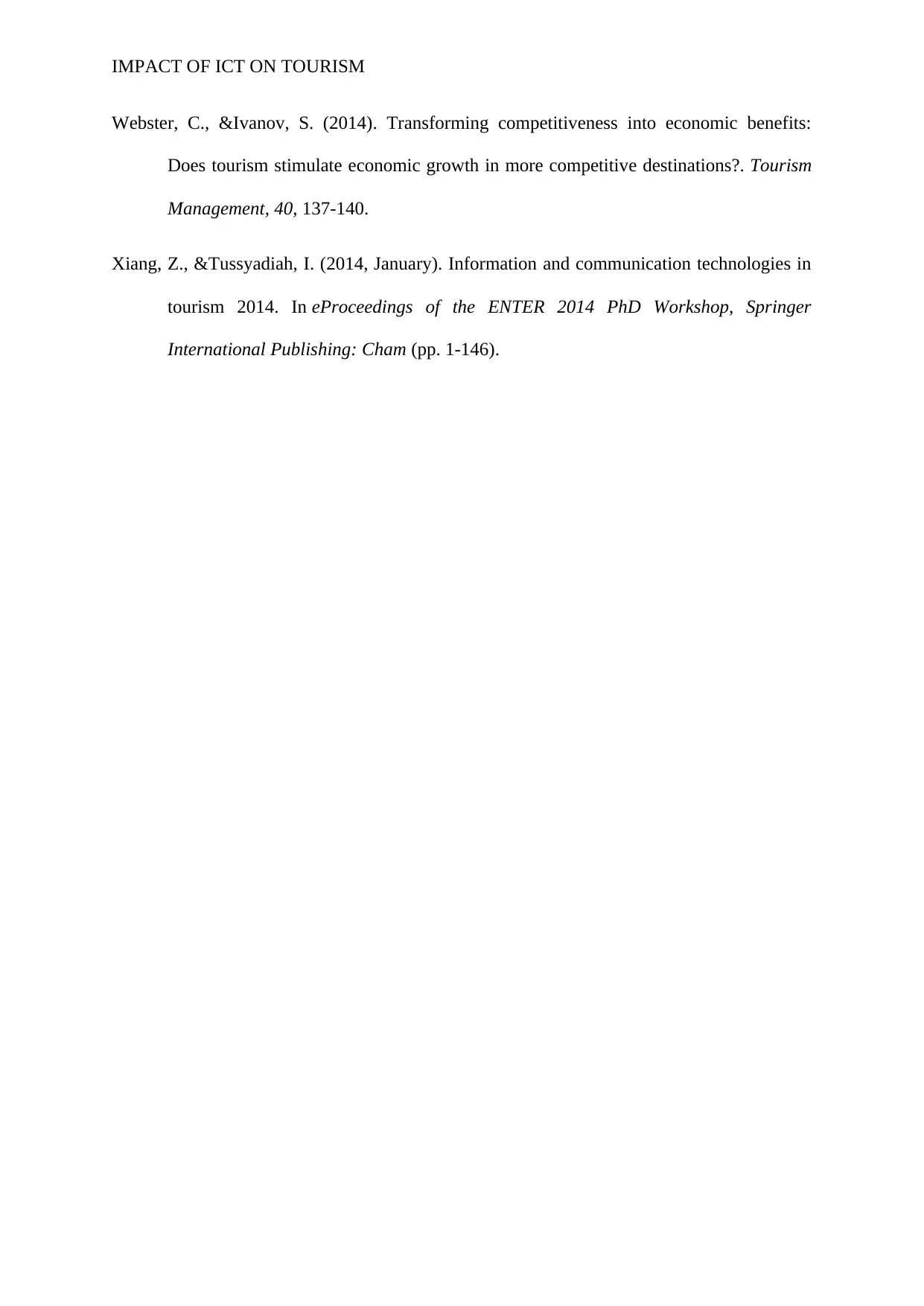
IMPACT OF ICT ON TOURISM
Webster, C., &Ivanov, S. (2014). Transforming competitiveness into economic benefits:
Does tourism stimulate economic growth in more competitive destinations?. Tourism
Management, 40, 137-140.
Xiang, Z., &Tussyadiah, I. (2014, January). Information and communication technologies in
tourism 2014. In eProceedings of the ENTER 2014 PhD Workshop, Springer
International Publishing: Cham (pp. 1-146).
Webster, C., &Ivanov, S. (2014). Transforming competitiveness into economic benefits:
Does tourism stimulate economic growth in more competitive destinations?. Tourism
Management, 40, 137-140.
Xiang, Z., &Tussyadiah, I. (2014, January). Information and communication technologies in
tourism 2014. In eProceedings of the ENTER 2014 PhD Workshop, Springer
International Publishing: Cham (pp. 1-146).
1 out of 7
Related Documents
Your All-in-One AI-Powered Toolkit for Academic Success.
+13062052269
info@desklib.com
Available 24*7 on WhatsApp / Email
![[object Object]](/_next/static/media/star-bottom.7253800d.svg)
Unlock your academic potential
Copyright © 2020–2026 A2Z Services. All Rights Reserved. Developed and managed by ZUCOL.





